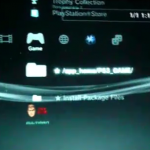You may have noticed something different at the bottom of this blog (if you’re viewing this post on my blog, as opposed to through the newsletter that is) – that’s right, WNR (via Digital Digest) has joined the 21st century social media thingamajig. This means that if you like this post, you can use one of the dozens of social media tools to let others know, and help me increase my readership numbers into double (or even triple!) digits. In addition, I’ve also set up what the kids call a ‘book of faces’ page right here (where every single news, deals and blog post will be pinned up on the wall, or something like that), and even managed to employ the services of that blue twittering bird here. So please, friend, follow, tweet, twang, hurl, zomg me on Facebook and Twitter, since I’m a bit lonely and pathetic on there at the moment and will soon have to resort to making up fake accounts just so I have some “friends”. And many of the news stories that I link to in the WNR will now be to the Digital Digest news section (as opposed to the forum thread like before, although a link to the relevant forum threads will still be located at the end of the news articles), and there, you will also see FB like buttons, Twitter tweet buttons, and even a FB powered comments section where you can point out the numerous speling mistakes I’ve made in the news post.
And there might be something in it for those of you that goes through the laborious process of clicking on a button to indicate your “friendship” or “cult follower status” with me, and the earlier you do it (and the greater number of you who do it) will increase the likelihood of something like this happening. Did someone say prizes? Amazon gift certificates? Details (if any) to be released soon. Just to be clear, yes, I am trying to buy some friends, so fingers crossed it works and I get enough likes and followers to make launching a competition possible!
Lots of news this week, so let’s get started.
 Let’s start the copyright news. The big wigs at the music arms of Sony and Universal did some brain storming the other day and came up with a new brilliant way to combat piracy: allow people to actually buy the music!
Let’s start the copyright news. The big wigs at the music arms of Sony and Universal did some brain storming the other day and came up with a new brilliant way to combat piracy: allow people to actually buy the music!
Apparently, not allowing people to legally buy something actually encourages people to seek illegal ways to obtain the same content, which must have come as a big shock to the Sony and Universal execs when their million dollar research revealed these findings, or something. Currently, when new music is released, it’s given airtime on the radio during an exclusive period before it was possible to buy the music legally, but research found that people searching for the new songs peaked weeks before the start of the sales period, and so, naturally, people just managed to get the song from “other” sources. So now, music will be made available for sale at the same time as when the radio airplay period starts, in a bid to curb online piracy. And it will only take a dozen more research reports before Sony, Universal and others realize that the same thing works for TV shows and movies, and that rental, release windows and delaying new TV show episodes by as long as 6 month in overseas markets, all contribute to the online piracy phenomenon.
Still staying in the music industry, the RIAA this week issued more threats to companies and organizations that it perceives as potential partners in the CRusade Against Piracy (CRAP™). The RIAA knows that the only way it can get others to do their dirty work in the futile war against online piracy (FWOP™) is to threaten them. This time, it’s ICANN, the people responsible for making the domain name standards, and the RIAA warns them that piracy syndicates might hijack planned music based TLDs like .music. Like as if music piracy websites would need to bother with .music, not if .riaasucks is available. It’s very likely though that the warning comes because the RIAA wants control of .music, but doesn’t have the cash to bid for it, and so they’re dreaming up an imaginary threat to force ICANN’s hands, a tactic that has worked well with governments around the world.
A threat that is not so imaginary is malware. Hands up those that *haven’t* been affected by malware, or know someone that has. Malware costs the economy something like $50+ billion a year, that’s even more than the imaginary numbers that the RIAA likes to invent, and yet it seems there’s hardly any action against the spread of malware, apart from the odd arrest of hacker or two, and only when the malware story makes national news (and this happens only because it infected all the computers at said news network). And yet, the US government alone is throwing millions of dollars and resources of the FBI, Homeland Security at fighting the online piracy problem, which may or may not even be a problem. I mention all this because of the story this week that malware writers are now using that old RIAA favourite, DRM, to protect their toolkits to sell or rent to those seeking to make a profit infecting unsuspecting servers and computers. But we already know for a fact the resources at the FBI have already been diverted away from investigating online and identity fraud, towards online piracy investigations, but I guess that’s because there is no such things as the “online fraud victims” lobby, or at least it doesn’t have as much cash to splash around compared to the entertainment lobby (probably because all of their cash has already been stolen via malware and identify fraud).

Onto HD/3D news, I posted a story about LG’s plans to make people buy more 3D TVs that use passive glasses, but mainly, it was just an excuse to post a link to this video.
But 3D TVs using passive glasses do have some advantages, after all, cinema 3D presentations are mostly based on the same technology. Sure, you won’t get a 1080p picture, but if it means less headaches and cheaper glasses, then it’s probably a good thing. Having had my 3D TV for about 6 month now, I’m still firmly convinced that 3D is still very much a gimmick, although one that’s very likely to be in every TV pretty soon (but only the active glasses kind, since it’s very inexpensive to add active glasses 3D support to HDTVs).
Something that also smells very gimmicky, possibly literally at some stage, is smell-o-vision. But what caught my eye about Scent Science’s new ScentScape machine is the low price attached to it. I don’t think it makes a huge difference to me if I can smell burning petrol or not as I blow up yet another car with my RPG in GTA IV, but for $70, the price of the ScentScape machine, it might just be worth a try. I wonder though what the most popular smells would be. Gunpowder would be one, blood another. But I do have reservations about playing a game like Fallout: New Vegas. I can’t imagine the post apocalyptic world and its inhabitants (and mutants) smelling very nice at all! Nor would watching Generation Kill (brilliant mini-series by the way) be pleasant if “a MOPP suit that smells like four days of piss and ball sweat” was made a reality, smell wise.
And Star Wars on Blu-ray now has a solid release date. September 27th, 2011. It will be the best seller on Blu-ray to date when released, I suspect.
![]()
And finally in gaming, some new developments in the PS3 hack saga. Sony’s court case against fail0verflow and geohot has been delayed due to jurisdiction issues relating to the fact that geohot, aka Geroge Hotz, does not live in California where the lawsuit was filed. Sony reasoned with the judge that, due to various clauses in the PSN user agreement and whatnot, it could still sue someone who doesn’t live in California, in California, but the judge has reservations about allowing Sony to bypass jurisdiction so easily this way. The EFF has also come out attacking Sony’s lawsuit, saying it sends a ‘dangerous message’, suing security researchers for exposing security flaws, when really, Sony should had worked with people like Hotz to plug any security holes before the console was released. Both fail0verflow and geohot stressed that they did this for academic purposes and for enabling homebrew, and all have made sure that piracy would not be promoted or allowed directly by their hacks (although indirectly, the hack can be further modified to enable piracy). So instead of suing those that actually use this hack to allow piracy, Sony are suing the guys that actually exposed the hack. It’s like arresting the guy who pointed out to you that your car is unlocked, as opposed to the guy who actually stole your car.

Waninkoko has a custom PS3 3.55 firmware that played backed up games, but it's bricking some PS3s (screencap credit: PSGroove.com)
More custom firmware has been released, this time by infamous Wii hacker Waninkoko, and this ones does allow pirated games to work. But the firmware apparently bricks older PS3s, those with 256MB NAND chips, a list of affected models here. The warning forum user Budreaux posted in the forum thread should be listened to … playing around with hacked firmware is a quick way to brick your PS3, void you warranty, and get you banned on PSN probably, not to mention possibly breaking the law depending on where you are. So do it strictly at your own risk!
And games that relied on the PS3’s now hacked security framework are beginning to feel the effect, with Modern Warfare 2 servers hacked to erase gamer scores and all sorts of other things that make the experience unbearable to gamers. Not all games are affected because developers wisely decided that solely relying on Sony’s framework wasn’t a good idea.
And the worst is yet to come, since Sony’s official response will almost certainly be harsh. Remember that this is the same company that thought a rootkit was a good idea. And so it comes as no surprise that Sony may be planning to bring serial keys to PS3 games in a bid to curb piracy. Not only do you have to type in the 16 character serial code into your PS3, which is painful enough already, these keys may only be reused 5 times, which makes selling and buying second hand games that much more annoying. And it will also mean that you won’t be able to play offline games without going online for authentication. But at this stage, this is just a unsubstantiated rumour, so who knows.
Another unsubstantiated rumous is that the Nintendo 3DS, still weeks away from an official release, has already been hacked despite Nintendo’s assurance of better anti-piracy measures. This does not surprise me one bit, if it’s true.
And even though geohot is busy defending himself against Sony’s legal onslaught, he still has time to hack, this time, Windows Phone 7. But Microsoft, probably giddy from the disasters befalling the PS3 at the moment, isn’t so mad at geohot, and has even promised to work together to “let dev creativity flourish”. This after Microsoft actively not caring about people hacking the Kinect … has the corporate monster changed?
Speaking of Kinect, the PR machine rolled on, and just like how the Wii gained public exposure due to the thousands of broken TV screens and vases, “Wii tennis elbow” and other medical phenomenons, the Kinect is gaining similar public exposure via YouTube ‘Kinect Fail’ videos and reports of even more serious injuries, and even a potential arrest. These fluff pieces may all sound like bad publicity, but there is no such thing as bad publicity, because everyone thinks that these things only happens to stupid people, not themselves, so there is no way one would get ‘Kinect Sports volleyball shoulders’ that is so painful that it makes sleeping difficult. Ow.
And that’s all for this week.
… checks FB and Twitter for the 15th time today … still no likes or followers




